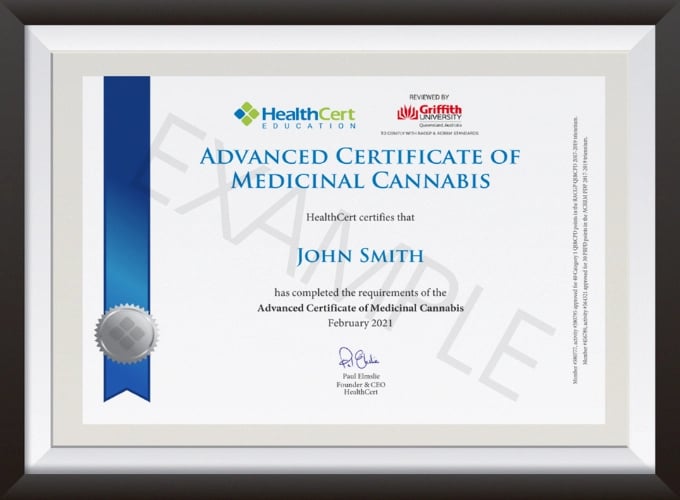This week we revisit a case submitted by Dr Cheh Goh. A nurse brings in their 62-year-old father...
.jpg?height=200&name=HCE%20HubSpot%20blog%20images%20600x350%20(52).jpg)
Explore the medical applications of cannabinoids to manage common health conditions in primary care.

Acquire the knowledge to manage and prescribe plant-based medicine for various conditions such as multiple sclerosis, tremors, diabetes, hypertension, glaucoma, autoimmune disorders, and more.
- Learn the remedial properties of plant-based therapy and its uses in mainstream medicine.
- Acquire knowledge from published case studies, peer reviewed research, and scientific learning resources.
- This course is for physicians, nurse practitioners, and degree-qualified nurses.
- CPD-accredited and university-reviewed.
Fulfils 50 hrs for medical professionals in Australia*
100% online
$1595
Special rates available
82 hrs
Self-paced
*provided an outcome measurement activity with a minimum of 5 hours is completed.

- Effectively treat multiple sclerosis-related symptoms.
- Use advanced techniques to manage treatment-resistant pain and migraines.
- Address autoimmune and inflammatory disorders with cannabinoids.
- Support patients suffering from inflammatory bowel disease, particularly Crohn's disease.
- Offer comprehensive care for your patients with autism, ADHD, OCD, and Tourette syndrome.
- Gain online plant-based medicine training to improve patient outcomes, especially for those patients with chronic or long-term health conditions commonly seen in general practice.
Get unlimited access to all course content, additional learning materials, ongoing post-course support, and more.
NOTE: GPs working in Australia (except for in Tasmania) may prescribe plant-based therapies, however, as part of the guidelines of the Therapeutic Goods Administration Special Access Scheme-B, you will need to acknowledge that you have the knowledge necessary to do so. This program will equip you with the knowledge required to manage and prescribe plant-based therapies for various conditions and can serve as part of your documentation showing you have undertaken education in this field when you decide to become an authorised prescriber. More information here.
This module examines the role of plant-based therapies in treating neuro-inflammatory and neurodegenerative conditions such as multiple sclerosis, Parkinson's disease, and dystonia syndrome. It explores the involvement of the endocannabinoid system in the regulation of motor behaviour and the high density of cannabinoid receptors in the central nervous system, suggesting that modulating this system may be pertinent in treating motor symptoms such as spasticity, tremor, and dystonia. Plant-based medicine in the form of an oro-mucosal spray has been shown to be beneficial at reducing spasticity in multiple sclerosis and has been registered on the Australian Register of Therapeutic Goods for some years. Other plant-based medicine formulations may also be useful in managing movement disorders such as Parkinson’s and dystonia. This module also reinforces the important role of plant-based therapies in alleviating non-motor-related symptoms such as depression, pain, insomnia, and anxiety as well as more broadly improving the patient's quality of life.
Plant-based medicine has been used to treat various pain states for centuries. But given the growing challenges in chronic pain management, we have begun to seek a more scientific, evidence-based approach to its use. This module weighs the evidence from significant research, reviews, and clinical trials regarding the use of plant-based therapies in chronic, neuropathic, and intractable pain. It examines the role of cannabinoids in managing pain as an adjunctive or opioid-sparing therapeutic agent or as a third-line therapy when other treatments have failed. The module also examines plant-based medicine use in ubiquitous headache disorders, which confer a significant personal and social burden of pain and disability and are also, often inadequately managed by conventional treatments. The module devotes a unit to the practical considerations of plant-based therapies. It recommends a treatment agreement between doctor and patient and outlines the features it should include such as setting goals, managing expectations, scheduling follow-up, and planning an exit strategy.
This module examines the use of plant-based medicine in the treatment of autoimmune disorders and inflammatory conditions, particularly rheumatoid arthritis and fibromyalgia. These conditions are common, debilitating chronic pain syndromes with serious comorbidities and can impose a considerable personal and social disease burden. The conventional treatments for both conditions are problematic, lacking specificity in fibromyalgia and poor adherence to the pharmacological load. Side effects in rheumatoid arthritis are considered. For both conditions, plant-based therapies and cannabinoids may offer a source of hope for sufferers and their physicians. When other treatment lines have been exhausted, plant-based therapies may be a reasonable option to reduce pain and comorbidities, support deficient endocannabinoid tone and affect disease progression by modulating autoimmune and inflammatory responses. The module, therefore, provides guidelines for choosing a cannabis product and formulation, managing dosing and titration, and enfolding this into a holistic approach to reducing inflammation.
This module focuses on inflammatory bowel disease – Crohn’s disease and ulcerative colitis. As the incidence of inflammatory bowel diseases rises, plant-based medicine has been increasingly researched for employment in these diseases, particularly in the symptomatic relief from abdominal pain, nausea, diarrhoea and an improved sense of well-being. This module examines the role of plant-based therapies in the management of Crohn's disease and ulcerative colitis. As with many chronic disorders, lifelong therapy is required and the pharmacological load in these conditions can be considerable with unacceptable side effects and only moderate control of symptoms. Given these factors, there is a role for plant-based medicine; not curative or as a substitute for conventional medications aimed at altering the underlying disease, but for symptom management and improved quality of life. The module takes the form of four case studies, which examine different methods of approaching plant-based therapy given the relative paucity of specific recommendations for usage. The cases represent four inflammatory bowel states and guide the practitioner through negotiating what is in essence, a very personalised medicine.
This module considers the role of plant-based medicine in the treatment of obsessive-compulsive disorder (OCD), attention-deficit / hyperactivity disorder (ADHD), autism spectrum disorder (ASD) and Tourette syndrome - all of which are encompassed in a wide spectrum of disease states. These neuropsychiatric disorders present a complicated diagnostic area where certain disease states may be comorbidities of another. Indeed, all conditions may exist concurrently with various ratios of each. In each condition, there is some form of dysregulation of the endocannabinoid system (ECS) and associated positive response to plant-based medicine when used to stimulate and support the ECS to facilitate better neurological functioning. Given that these conditions usually commence in childhood, the module discusses protocols and ethical considerations for treating the paediatric population with cannabinoid medicines. Case studies highlight the caution and flexibility required to achieve acceptable results with this highly individualised therapy, including careful, stepwise titration and monitoring with THC, consideration of different chemovars, and frequent communication with patients and carers.
This module examines the role of plant-based therapies in type 1 and type 2 diabetes, metabolic syndrome, the comorbidity of glaucoma (secondary to retinopathy) and hypertension, which accelerates the risk and course of cardiovascular and other comorbidities. The module discusses salient evidence and research findings such as the effects of recreational cannabis use in diabetes, the uniquely diverse properties of THCV, and the anti-diabetic effects of Rimonabant. THC, CBD, and minor cannabinoids such as THCV, may be beneficial in the management of diabetes but should be used adjunctively with conventional treatments. Careful monitoring of changes in the diabetic patient's blood sugar is necessary and glycaemic medications altered only if indicated. Cannabinoids may also treat a raft of diabetes-associated conditions such as hypertension and retinopathy. Case studies explore the use of plant-based therapies for symptoms such as neuropathic pain, insomnia and restless leg syndrome in both plant-based therapy experienced and naive patients as well as possible benefits such as changes in weight, blood sugar, and blood pressure.
This module examines the endocannabinoid system in the female reproductive tissues and the potential role of plant-based medicine in women’s health. The symptoms of endometriosis and premenstrual syndrome may be extreme, debilitating and significantly impact the quality of life. Conventional treatments for these conditions are limited, with severe side effects making plant-based therapies a reasonable option. Conversely, osteoporosis may be asymptomatic until fractures profoundly impact the morbidity and mortality of the patient. The module also considers research indicating that endocannabinoid dysregulation is involved in each of these disorders and the potential for activation or suppression of certain receptors with cannabinoids may support healthy endocannabinoid system homeostatic function in women's health. THC and CBD may play a role in modulating pain, reducing inflammation, regulating immune function, rebalancing endocannabinoid tone, enhancing bone healing and regeneration, and treating/preventing age-related and hormone deficiency-related bone loss and osteoporosis. The module guides the practitioner through choosing a plant-based product for these conditions.
This module discusses the considerable potential for plant-based therapies (particularly CBD) to treat skin disorders, particularly those with an inflammatory component. It examines conditions such as eczema, psoriasis, fibrotic disorders (scleroderma), and non-melanoma skin cancer. The endocannabinoid system of the skin maintains cutaneous homeostasis and plays an important role in the regulation of the physiology of the skin, including the hair follicle and the immune system. The dysregulation of this system is linked to a wide variety of dermatological disorders. Research suggests that modulation of the endocannabinoid system could be a promising strategy for the treatment of skin disorders. The module also explores the relatively new area of plant-based medicine support for pulmonary conditions given the bronchodilatory effect of THC and the anti-inflammatory effect of CBD. There is also the potential for endocannabinoid system-mediated immune modulation and anti-inflammatory responses. The module offers guidelines for the treatment of skin and pulmonary conditions with plant-based medicine including the specific formulations for topical and inhaled administration.

Professor, Metabolism, School of Pharmacy and Biomedical Sciences, Curtin University, Australia
Professor Marco Falasca graduated in Pharmacy and then in Pharmaceutical Chemistry at the University of Camerino, Italy. His education further includes a Diploma of Specialisation in Applied Pharmacology at the University of Bari and a FORMEZ Research Award (PhD equivalent) at the Consorzio Mario Negri Sud, Italy. After three years at the New York University Medical Center, Department of Pharmacology (Head Prof Joseph Schlessinger), Prof Falasca took up a position as Head of the Unit of Physiopathology of Cell Signalling within the Consorzio Mario Negri Sud in 1998.
In 2001 he moved to London where he was appointed as Principal Research Fellow, Senior Lecturer within the Department of Medicine at the University College London. In 2007 he was appointed as Professor of Molecular Pharmacology at the Queen Mary University of London. He is currently Professor of Metabolism at Curtin University, Australia. He has published more than 100 papers in reputed journals and has been serving as an editorial board member for several international journals.
The focus of Prof Falasca’s research in the past 25 years has involved the investigation of signalling pathways regulating intracellular physiological and pathological processes. Prof Falasca’s current specific projects are dedicated to the investigation of the mechanisms involved in development and progression of pancreatic diseases.

.png?width=143&height=143&name=Joe%20Kosterich%20(3).png)

$1595
*provided an outcome measurement activity with a minimum of 5 hours is completed.
Bundle two courses and save 5%, or three courses and save 10% upon enrolment.
Talk to us about deferred payment options, registrar scholarships and special rates.
*For Australian residents only: Online course prices are shown exclusive of GST. If you are GST-registered, please enter a valid ABN at checkout to ensure GST is not applied. Otherwise, 10% GST will be added at checkout. View our FAQ for more information.


HealthCert courses have become the standard by which you gauge all others.
Dr K. Abolarinwa
Good courses with excellent speakers. I particularly enjoyed the case study scenarios which helped to integrate the knowledge gained.
Dr A. Tucker
This is the pathway to improve your confidence and evolve into the GP you aspire to be.
Dr S. Shinwari
| RACGP Activity Number | ACRRM Activity Number | Activity Title | Education Hours | Performance Hours | Outcome Hours | ||
|---|---|---|---|---|---|---|---|
| 414172 | 30975 | Multiple sclerosis, spasticity, tremor, dystonia | 414172 | 30975 | 4.5 | 6 | 0 |
| 414209 | 30978 | Inflammatory bowel disease - Chrons Disease and Ulcerative Colitis | 414209 | 30978 | 4.5 | 6 | 0 |
| 414236 | 30982 | COPD, asthma, eczema, psoriasis, skin conditions | 414236 | 30982 | 4.5 | 6 | 0 |
| 414217 | 30979 | ASD - Autism, ADHD, OCD, Tourettes | 414217 | 30979 | 4 | 6 | 0 |
| 414230 | 30981 | Womens health and endometriosis, PMT, osteoporosis | 414230 | 30981 | 4 | 6 | 0 |
| 414189 | 30976 | Treatment resistant pain, neuropathic pain, cluster headaches and migraines | 414189 | 30976 | 4.5 | 6 | 0 |
| 414204 | 30977 | Auto immune disorders - Rheumatoid arthritis, Fibromyalgia | 414204 | 30977 | 4 | 6 | 0 |
| 414226 | 30980 | Diabetes, Glaucoma, hypertension | 414226 | 30980 | 4 | 6 | 0 |
| 809247 | 32981 | Endometriosis Outcome Improvement Activity | 809247 | 32981 | 0 | 0 | 8.5 |
| Total hours | 34 | 48 | 8.5 | ||||
View the CPD Hours for all HealthCert Education activities.
The purpose of outcome measurement activities is to improve your clinical confidence in managing an identified learning gap. Outcome measurement activities are not a requirement of our Professional Certificate of Advanced Certificate courses; they are a requirement for Australian CPD purposes.
HealthCert Education provides a variety of outcome measurements activities to suit your needs:
This Advanced Certificate of Medicinal Cannabis is suitable for physicians, nurse practitioners, and degree-qualified nurses. The prerequisite course is the HealthCert Professional Certificate of Medicinal Cannabis (or qualification deemed equivalent).
Participants do not have to pass an IELTS test but, as the courses are delivered in English, proficiency in listening, reading and writing English is assumed.
Participants will require access to a computer/laptop, an internet connection and a basic level of technology proficiency to access and navigate the online learning portal.
This certificate course meets the minimum 50 hours CPD annual requirement across all three mandatory CPD activity types, provided an outcome measurement activity with a minimum of five hours is completed. You may use an optional HealthCert outcome measurement activity or develop your own.
Outcome measurement activities are not a requirement of Professional or Advanced Certificates.
Upon successful completion of the exam, course participants will receive an Advanced Certificate of Medicinal Cannabis and CPD hours.
This certificate course:
To learn more about the delivery of certificates in Australia and overseas, please visit our FAQs.
Professional Diploma Pathway
This course is the second stage of the three-part Professional Diploma of Medicinal Cannabis. The education pathway is Professional Certificate of Medicinal Cannabis, Advanced Certificate of Medicinal Cannabis and Professional Diploma of Medicinal Cannabis.
GPs working in Australia (except for in Tasmania) may prescribe plant-based therapies, however, as part of the guidelines of the TGA SAS-B, you will need to indicate that you have the knowledge necessary to do so. This program will equip you with the knowledge required to manage and prescribe plant-based therapies for various conditions and can serve as part of your documentation showing that you have undertaken education in this field when you decide to become an authorised prescriber. More information here.
This organisation is an RACGP-accredited CPD provider under the RACGP CPD Program.





Don't see your question? Explore other FAQs or talk to us.
Fees will vary based on the program and study option selected (fully online vs online + optional practical workshop). Payments can be made upfront or in monthly instalments. Special rates and various payment options are available. GP registrars and doctors in training enjoy a scholarship of up to $500. Talk to us to learn more.
Completion of any HealthCert course or attendance at an event will enable you to access the HealthCert Alumni Program which includes:
HealthCert Education is pleased to issue digital credentials for alumni. Digital credentials are a permanent online record of your successful completion of a HealthCert course and are issued to all course participants in addition to PDF certificates. If you are based in Australia, you also have the option to order a hard copy of your digital certificate for a small additional fee.
The recommended study duration of this certificate course is 82 hours, which includes study of the pre-course activities and readings, online lectures, live tutorials, and online assessment. This self-paced course offers the flexibility of 100% online study in your own time, at your own pace, in your own home or office, with no mandatory face-to-face requirements. You are not required to be online at specific times but can view and replay video lectures at your convenience.
All HealthCert courses meet World Federation of Medical Education standards. This certificate course qualifies for CPD hours from the Royal Australian College of General Practitioners (RACGP) and the Australian College of Rural and Remote Medicine (ACRRM) in Australia. If you live or work outside Australia, please contact us on admin@healthcert.com to discuss whether this course can be recognised in your country.
Want to stay up-to-date with the latest case studies, podcasts, free video tutorials and medical research articles pertinent to primary care?
Our Education Advisors can assist you with any queries and tailor our education pathway to suit your current expertise, interests and career goals.